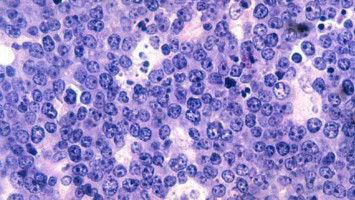
Patients with relapsed/refractory classical Hodgkin lymphoma (R/R cHL) have few treatment options when they are ineligible for autologous stem-cell transplantation (SCT) due to chemo-refractory disease, co-morbidities, or advanced age.
Blocking the programmed cell death protein 1 (PD-1) with pembrolizumab has shown promising anti-tumour activity in a phase 2 study.
Now, the phase 3 KEYNOTE-204 study has compared the efficacy and safety of pembrolizumab with that of brentuximab vedotin in patients with R/R cHL.
Patients with R/R cHL were randomly assigned 1:1 to receive pembrolizumab at 200 mg or brentuximab vedotin at 1.8 mg/kg every three weeks.
These patients had prior autologous SCT or were ineligible for autologous SCT, had measurable disease, and Eastern Cooperative Oncology Group performance status 0 or 1.
The treatment effect was evaluated with the primary end points progression-free survival (PFS) and overall survival.
Pembrolizumab monotherapy showed statistically significant and clinically meaningful improvement in PFS compared with brentuximab vedotin (13.2 vs 8.3 months; hazard ratio [95% CI]: 0.65 [0.48-0.88]; P = 0.00271) with a safety profile that was consistent with the known profiles of each agent.
In addition, the PFS benefit extended to key subgroups of patients with R/R cHL, including those with primary refractory disease or those who did not receive prior autologous SCT.
Therefore, pembrolizumab should be considered the preferred treatment option and new standard of care for the treatment of R/R cHL in patients who have relapsed after autologous SCT or are ineligible for autologous SCT.
Source: EHA
We are an independent charity and are not backed by a large company or society. We raise every penny ourselves to improve the standards of cancer care through education. You can help us continue our work to address inequalities in cancer care by making a donation.
Any donation, however small, contributes directly towards the costs of creating and sharing free oncology education.
Together we can get better outcomes for patients by tackling global inequalities in access to the results of cancer research.
Thank you for your support.